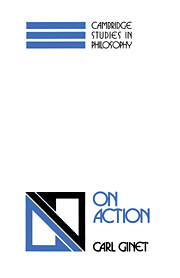5 - FREE WILL VERSUS DETERMINISM
Published online by Cambridge University Press: 05 June 2012
Summary
Is freedom of the will compatible with determinism? I think not, and I would like to explain why.
First, let me explain what I take this venerable question to mean. By freedom of the will is meant freedom of action. I have freedom of action at a given moment if more than one alternative action is then open to me. Two or more actions are alternatives if it is logically impossible for me to do more than one of them at the same time. Two or more alternatives are open to me at a given moment if which of them I do next is entirely up to my choice at that moment: Nothing that exists up to that moment stands in the way of my doing next any one of the alternatives.
OUR IMPRESSION OF FREEDOM DOES NOT MAKE US FREE
We all continually have the impression that our wills are thus free. For example, at most moments while I am sitting and talking or listening to someone, I have the impression that there are several alternative things I could do next with my right hand: gesture with it, scratch my head with it, put it on my lap, put it in my pocket, and so on. For each of these alternatives, it seems to me that nothing at all up to that moment stands in the way of my making it the next thing I do with my right hand; it seems to me that what has happened hitherto, the situation at that moment, leaves each of those alternatives still open to me to perform.
- Type
- Chapter
- Information
- On Action , pp. 90 - 123Publisher: Cambridge University PressPrint publication year: 1990



